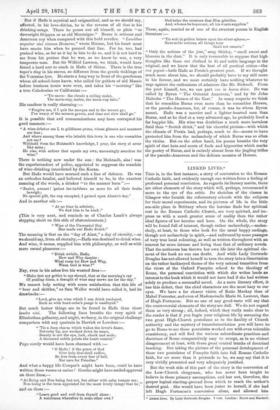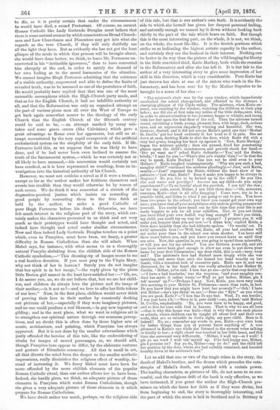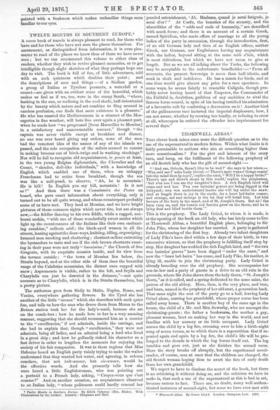LINKED LIVES.* This is, in the first instance, a story
of conversion to the Roman. Catholic faith, and evidently enough one written from a feeling of profound personal conviction. As regards its literary merits, there are other elements of the story which will, perhaps, recommend it more to the eye of the critic. Its sketches of the classes in Glasgow who furnish the reformatory schools with the subjects. for their moral experiments, and its pictures of life in the little sea-side place in Brittany where the heroine finds her spiritual rest in the Roman Catholic Church, are very spirited, and im- press us with a much greater sense of reality than the rather ideal figures of her heroine and hero. On the whole, the story will be found full of interest, though rather melancholy,--melan,- choly, at least, to those who look for the usual happy. ending,- though not melancholy in spirit,—and enlivened by some passages. of very true local colouring, as well es written throughout with an interest far more intense and living than that of ordinary novels. That the authoress has thrown her own life into the spiritual ele-
ment of the book no one can doubt. And while Lady Gertrude- Douglas has not allowed herself to turn the story into a dissertation
on the rather hackneyed theme of the very natural transition from
the views of the Oxford Puseyite school to the theology of Rome, the personal conviction with which she writes lends an
interest to the book which it would not have had if she had written solely to produce a successful novel. As a mere literary effort, it has this defect, that the chief characters are the most hazy to our eyes. We have a far clearer vision of Katie Mackay than of
Mabel Forrester, and even of Mademoiselle Marie St. Laurent, than a Hugh Fortescue. But no one of any good-taste will say that
the controversial elements of the story are dull. We do not regard them as very strong ; all, indeed, which they really make clear to- the reader is that if you begin your religious life by assuming the two great High-Church postulates as to the finality of Church authority and the mystery of transubstantiation you will have to. go to Rome to see these postulates worked out with even tolerable- consistency, and will find the various subordinate practices and doctrines of Rome comparatively easy to accept, as in no violent
disagreement at least, with those great central trunks of doctrinal teaching. But taking the picture of the personal development of these two postulates of Puseyite faith into full Roman Catholic- faith, for no more than it pretends to be, we may say that it is very vividly presented and very adequately justified.
But the weak side of this part of the story is the conversion of the Low-Church clergyman, who has never been taught to.
believe in these primary assumptions, and has not, therefore, the proper logical starting-ground from which to reach the author's desired goal. She would have been juster to herself, if she hod left Hugh Fortescue's conversion alone, and allowed him .Linked Urea By Lady Gertrude Douglas. 3 vols. London: Hurst and Blaokett.. to die, as it is pretty certain that under the circumstances he would have died, a sound Protestant. Of course, an earnest Itoman Catholic like Lady Gertrude Douglas must believe that there is some natural avenue by which conscientious Broad Church- men and Low Churchmen and Dissenters may get into what she regards as the true Church, if they will only dutifully use all the light they have. But as evidently she has not got the least glimpse of the mode in which that process will be brought about, the would have done better, we think, to leave Mr. Fortescue un- converted in his "invincible ignorance," than to have converted him abruptly at the end, in order to satisfy the demand of her own feeling as to the moral harmonies of the situation. We cannot imagine Hugh Fortescue admitting that the existence of a visible authority, empowered and able to define the limits of revealed truth, was to be assumed as one of the postulates of faith. Ile would probably have replied that that was one of the most -untenable assumptions which the High-Church party made, and that as for the English Church, it had no infallible authority at all, and that the Reformation was only an organised attempt on the part of various pious men all over the West of Europe to get back again somewhat nearer to the theology of the early Church than the English Church of the fifteenth century could be said to be, — an attempt marked by many mis- takes and some grave errors (like Calvinism) which gave a great advantage to Rome over her opponents, but still an at- tempt necessitated by the very rapid overgrowth of the artificial ecclesiastical system on the simplicity of the early faith. If Mr. Fortescue held this, as we suppose that he was likely to have done, and if he had never been even inclined to assume the truth of the Sacramental system,—which he was certainly not at all likely to have assumed,—his conversion would certainly not have resulted, as it is here represented as resulting, from an in- vestigation into the historical authority of his Church.
However, we must not criticise a novel as if it were a treatise, except so far as the-author makes her fictitious characters and events less credible than they would otherwise be by reason of such errors. We do think it was somewhat of a stretch of the dogmatico-poetical justice which insists on rewarding all good people by converting them to the true faith as held by the author, to make a good Catholic of poor Hugh Fortescue before his death. Otherwise, we have felt much interest in the religious part of the story, which cer- tainly makes the characters presented to us think and act very much as their prototypes would have thought and acted, and indeed have thought and acted under similiar circumstances. Now and then indeed Lady Gertrude Douglas touches on a point which, even to Puseyites, must have been, we fancy, a greater -difficulty in Roman Catholicism than she will admit.. When Mabel says, for instance, with what seems to us a thoroughly natural Puseyite shrinking from the childish side of the Roman Catholic symbolism,—" This dressing-up of images seems to me a real heathen devotion. If you must pray to the Virgin Mary, why not think of her in heaven Surely you do not imagine that her spirit is in her image,"—the reply given by the pious little Breton girl cannot in the least have satisfied her :—" Oh, no, I do assure you, no, we do not believe that, but we are her child- ren, and children do always love the picture and the image of their mother,—is it not so ?—and we love to offer her little tokens of our love." Now, in the first place, children would never think -of proving their love to their mother by constantly decking rout pictures of her,—especially if they were imaginary pictures, and no one could produce a real likeness,—in gay new tapestry or gilding; and in the next place, what we want in religious art is to strengthen our spiritual nature through our sensuous percep- tions, and no doubt this is often done by those higher arts of music, architecture, and painting, which Puseyism has always approved. But it is not done by the smaller externalisms which justly offended the heroine of this tale, like the embroidering of cloaks for images of sacred personages, or, we should add, though Puseyiths here appear to differ, by the elaborate costume and gesture of Ritualistic ceremony. All that is small in art, all that diverts the mind from the deeper to the smaller aesthetic impressions, really diminishes the religious effect of worship, in- stead of increasing it. We fancy Mabel must have been far snore offended by the more childish elements of the popular Roman Catholic ritual, than our author allows her to have been. Indeed, she hardly gives, we think, an adequate picture of those elements in Puseyism which resist Roman Catholicism, though -she gives a very adequate picture of those elements in it which prepare for Roman Catholicism.
We have dwelt rather too much, perhaps, on the religious side of this tale, but that is our author's own fault. It is evidently the side to which she herself has given her deepest personal feeling, and naturally enough we cannot lay it down without looking back chiefly to the part of the tale which bears on faith. But though this is the most interesting part, on the whole, it is not, we think, on the whole, the most life-like. It is the Scotch portions which strike us as indicating the highest artistic capacity in the author, and certainly they are the freshest in their interest. Nothing can be better in its way than the picture of the wild longing for liberty in the little convicted thief, Katie Mackay, both while she remains in the Reformatory and after she has left it. It is but fair to the author of a very interesting story to give some impression of her skill in this direction, which is very considerable. Poor Katie has just thrown her slate at one of the sisters who teach in the Re- formatory, and has been sent for by the Mother Superior to be brought to a sense of her sins :—
,4 The mistress's chair was by the open window, which immediately overlooked the school play-ground, and afforded in the distance a charming glimpse of the Clyde valley. The mistress, when Katie en- tered, was standing by the window, watching the children at their play below ; nor did she at first take any notice of the little delinquent, who, in order to attract attention to her presence, began to whistle, and stamp with her feet upon the deal floor of the cell. Then the mistress turned round, exhibiting a fresh, young, pleasant face, with large, dark, serious eyes, and an expression singularly winning and beautiful. She was, however, flushed, and it did not escape Katie's quick eye that 'Mother St. Cecilia' put her hand suddenly to her head as if in pain. She sat down at once, desiring Katie to shut the door, which Katie did with a very bad grace, banging her back up against it. 'Now, Katie Mackay,' began the mistress quietly ; then she paused, fixed her penetrating glance upon the child's countenance and gravely shook her head.— 'Div ye want me ?' asked Katie defiantly.—' Yes,' said the Sister, briefly, I sent for you.'—' What's this ye's wantin' then?'—' Is that the way to speak, Katie Mackay ? Can you not be civil even to your Mothers !' Katie laughed contemptuously. Why are you such a bad, naughty child ?' continued the mistress pleadingly.—' Just,' said Katie, saucily.—' Just!' repeated the Sister, without the least show of im- patience—' just what, Katie? Does it make you happy to be always in disgrace? Do you like to be locked up in the cells ? Do you like rice and water and porridge ? Answer me, my child—do you enjoy punishment?'—' I's no heedin' aboot the parritch. I can tak' the rice ; an' for the cells, aweel, Mither, I aye likit them fine.'—' Oh, nonsense, nonsense, Katie—that is all silly bragging ! Come now, try to be a sensible child, and listen to what I am going to say to you. You have been two years in the school ; you know you cannot get your own way here; you know that all your naughtiness only ends in getting penance for yourself. You surely have found out by this time that your life is not made happier to you for all your rebellion. Now, do you not think you have tried your own foolish way long enough? Don't you think, my child, you could try my way for a change ? I promise you it will make you happier than you are now.'—' I dinna ken,' replied Katie, a little more humbly than she had hitherto spoken. I's wantin' oot. Fe awfn' miserable here !'—' Well, but, Katie, all your bad conduct will not make your time in the school one atom shorter. You have still three years before you, and you know you cannot leave us until they are over. Now, the question is, are you going to spend them miserably, or will you not try my advice ? You are thirteen years old, and yet you have never been good enough to allow me even to put down your name for your first Communion ; my dear child, this is sad—very, very sad !' The mistress's face had flushed more deeply while she was speaking, and more than once she leaned her head wearily on her hands, with a transient look of excessive pain. Katie saw it, and was distressed, for in her heart she was really attached to her Mother St. Cecilia. 'Mither, ye're sick. I ken fine ye are—ye're that rosy-lookin' —'I have a bad headache,' was the response, and your naughty con- duct has made it rather worse.'—' Wall ye get better, Mither, gin I tak' meeser up ?'—' Perhaps I may. Now, Katie, you were very rude this morning to your Mother St. Philomena—more than rude, in fact. Do you know that you might have hurt her severely?'—' Och ! I hate you Mither—she's aye flytin' on me.'—' Does she " flyte" on you when you are good, Katie ?'—' I ken fine I's aye bad. Weel, I's nae heedin',
I war just born Born to it, poor child !—no, indeed,' said Mother St. Cecilia, emphatically. No, you were born to be happy, and good, and to live for ever with God in heaven. That is why we are all here —that is why this house was built—that is why there are such places as schools, where children can be taught all about God and their own souls, that are so valuable in God's sight, my poor child. Born to it indeed! No, no ; remember my words to you, Katie—you were born for better things than you at present know anything of.' A tear glistened in Katie's eye while she listened to the earnest voice talking so kindly to her; a right chord was touched in her little heart, and this time she answered very differently. Mither, I wull try—so I wull ! I gie ye me word I wull tak' myself up. D'ye feel happy noo, Mither, gin I promise ye? Say ye do, Mither—say ye do !' and the child left her position by the door, where she had sullenly remained, and kneeled humbly down at the mistress's feet."
Let us add that one or two of the tragic crises in the story, the death of Mabel's brother, and the dream which precedes the cata- strophe of Mabers death, are painted with a certain power. The leading characters, as pictures of life, do not seem to us suc- cessful, and the religions drift of the book is only effective, as we have intimated, if you grant the author the High-Church pre- misses on which she bases her faith as if they were divine, but from beginning to end, the story is thoroughly interesting, and the part of which the scene is laid in Scotland and in Brittany is Tainted with a freshness which makes unfamiliar things seem 'familiar to our eyes.




































 Previous page
Previous page